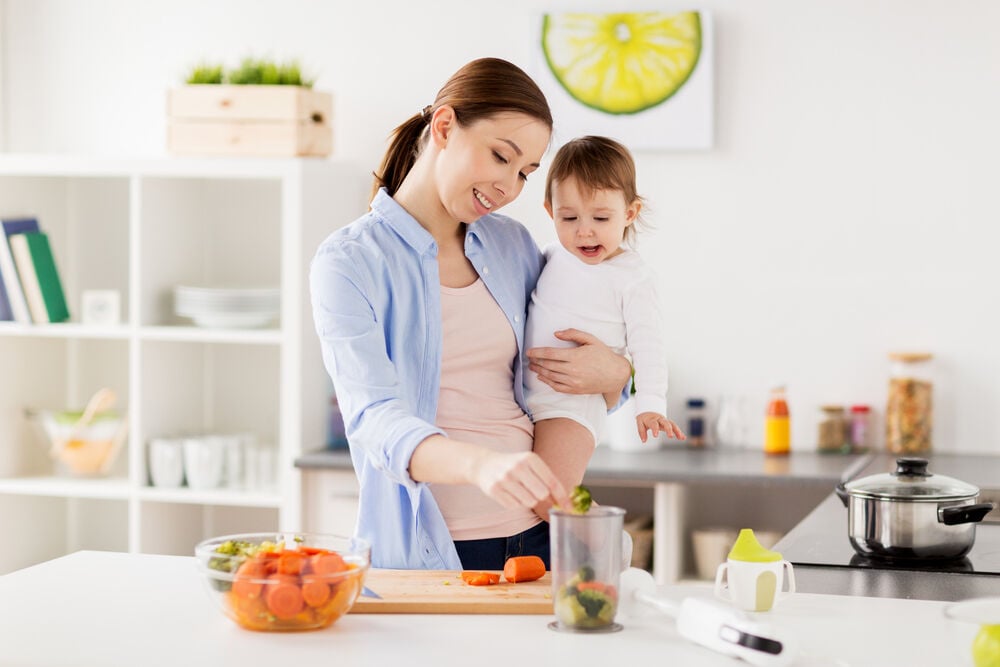By the time your baby is 11 months old, you might be wondering when they got so big. It might seem like it was only yesterday when you came home with your tiny newborn, and now they're growing bigger and eating all sorts of things. We've put together some of the best foods for 11-month-old babies.
-
Tracking cycle
-
Getting pregnant
-
Pregnancy
-
Help Center
-
Flo for Partners
-
Anonymous Mode
-
Flo app reviews
-
Flo Premium New
-
Secret Chats New
-
Symptom Checker New
-
Your cycle
-
Health 360°
-
Getting pregnant
-
Pregnancy
-
Being a mom
-
LGBTQ+
-
Quizzes
-
Ovulation calculator
-
hCG calculator
-
Pregnancy test calculator
-
Menstrual cycle calculator
-
Period calculator
-
Implantation calculator
-
Pregnancy weeks to months calculator
-
Pregnancy due date calculator
-
IVF and FET due date calculator
-
Due date calculator by ultrasound
-
Medical Affairs
-
Science & Research
-
Pass It On Project New
-
Privacy Portal
-
Press Center
-
Flo Accuracy
-
Careers
-
Contact Us
Baby Food for 11-Month-Olds: Menus, Recipes, and Ideas


Every piece of content at Flo Health adheres to the highest editorial standards for language, style, and medical accuracy. To learn what we do to deliver the best health and lifestyle insights to you, check out our content review principles.
What are good baby foods for 11-month-olds?
It may seem like your baby was breastfeeding exclusively until very recently, but at 11 months old, your baby can eat many of the same foods that the rest of the family eats.
There are still some foods that they shouldn't have and certain preparation methods that you need to follow. Here are some of the things to avoid when planning a menu for an 11-month-old:
- Sugar — Your baby doesn't need to consume added sugar, and this ingredient can lead to tooth decay. Avoid giving your baby sugary snacks or drinks, and don't add extra sugar to their food. Instead, offer them a variety of fresh, non-citrus fruit.
- Salt — Added salt isn't good for your baby's kidneys. You don't need to add salt to their food. If you're cooking a family meal that your baby can eat, set a portion aside for the baby before you season it. Avoid salty snacks such as salty crackers, chips, and deli meats.
- Honey — Honey is delicious, but it can contain bacteria that cause botulism. Avoid giving your baby honey until their first birthday.
- Unpasteurized dairy products — Babies can eat pasteurized cheese when they're six months old, but unpasteurized cheeses can be harmful. Cheeses made with unpasteurized milk or mold-ripened cheeses, such as roquefort and brie, can contain a bacteria called listeria. Instead, offer your baby cheddar cheese, cottage cheese, and cream cheese.
- Cow's milk — Dairy products, such as yogurt or pasteurized cheeses, are a great addition to your 11-month-old baby's food list. However, they shouldn't drink cow's milk until they're at least one year old. Instead, give them formula, breastfeed them, or provide breast milk that was stored previously.
- Saturated fats — Avoid fried foods, processed meats, butter, baked desserts, cream, and mayonnaise.
- Highly processed foods — Your baby doesn't need to consume the additives, artificial colors, and flavorings that come in lots of processed foods such as candy, breakfast cereals, microwave meals, ice cream, and chips. These foods should be an occasional snack rather than a dietary staple.
- Whole nuts — Nuts and seeds can pose a choking hazard for your 11-month-old baby. Instead, you can offer them nut butter.
- Uncooked eggs — Make sure any eggs your baby eats are fully cooked to avoid possible salmonella infections. Avoid foods that contain raw eggs, such as cake batter or homemade mayonnaise.
- Raw fish or seafood — These foods carry an increased risk of food poisoning. Stick to fully cooked fish until your baby is at least one year old.
Take a quiz
Find out what you can do with our Health Assistant
How much food does an 11-month-old need?
It might be messy at first, but allowing babies to eat on their own can help them develop their fine motor skills, independence, coordination, and body and food awareness. Don't force your baby to eat. Forcing babies to finish every meal can cause them to negatively impact their relationship with food. Make sure that you cut your baby's food into small pieces, and allow them to feed themselves while keeping a close eye on them.
Here's a quick guide to the portion sizes that your 11-month-old baby needs each day:
- Protein: Up to 4 tablespoons
- Vegetables: Up to half a cup
- Fruits: Up to half a cup
- Cereals: Up to half a cup
- Dairy: Up to 3 tablespoons
- Breast milk or formula: 22 to 32 oz
If your child has already stopped breastfeeding, make sure they're still drinking formula or stored breast milk every day. You can also follow these tips to increase your breast milk if your supply has gotten too low. Breast milk or formula can provide up to half of your child's nutritional requirements until they're a year old. It's very likely that they'll want to breastfeed less frequently once solid foods are introduced; therefore, breastfeeding should be actively encouraged at this age.
Menu for 11-month-old babies
Here are some meal ideas for your 11-month-old baby:
Breakfast:
- Eggs and toast
- Blueberry whole-wheat pancakes
- Cheese sandwich
Lunch:
- Chicken and vegetables
- Macaroni and cheese
- Homemade lasagna
Dinner:
- Creamy chicken and vegetable soup
- Lean steak and vegetables
- Cereal with fruit
Snacks:
- Fruits and peanut butter
- Yogurt with cereal or fruit
- Boiled eggs
Food ideas for 11-month-old babies

Here are some ideas to help you come up with new recipes for your 11-month-old baby:
- Try new ways to cook your baby's vegetables. Rather than sticking to the usual ways you cook your vegetables, try grilling or sauteing them so that your baby experiences new textures and flavors.
- Create homemade versions of your favorite foods. Your baby shouldn't be eating frozen lasagna or pizza, but you can cook healthier, homemade versions of your favorite meals so that they can try them.
- Only introduce one new food every couple of days. If you introduce too many new foods at once, and one of them causes an allergy, it will be hard to determine which one it was. Instead, introduce one food at a time and wait a few days before trying something else.
Recipes for 11-month-old babies
- Vegetable and chicken soup — Boil broccoli, potatoes, and a chicken breast. Then, blend the solid ingredients together and add some of the stock. This soup will have a creamy consistency, and you can even add some cheese on top.
- Homemade frozen smoothies — Freeze ripe bananas. Once they're frozen, blend them until they're smooth. You can add other fruits such as strawberries and blueberries. Keep it in the freezer for a healthy, cool snack.
- Homemade pizza — Use pita bread for the crust and puree some peeled tomatoes to make the sauce. Top with mozzarella cheese and fresh basil before placing it in the oven.
Food for your 11-month-old baby is very similar to food for the rest of the family. At this age, they'll be able to eat on their own and discover many wonderful new flavors, textures, and sensations. They'll be eating a piece of their own birthday cake very soon!


Hey, I'm Anique
I started using Flo app to track my period and ovulation because we wanted to have a baby.


The Flo app helped me learn about my body and spot ovulation signs during our conception journey.


I vividly
remember the day
that we switched
Flo into
Pregnancy Mode — it was
such a special
moment.
Real stories, real results
Learn how the Flo app became an amazing cheerleader for us on our conception journey.
References
“Complementary Feeding.” Infant and Young Child Feeding: Model Chapter for Textbooks for Medical Students and Allied Health Professionals., U.S. National Library of Medicine, 1 Jan. 1970, www.ncbi.nlm.nih.gov/books/NBK148957/.
NHS Choices, NHS, www.nhs.uk/conditions/pregnancy-and-baby/foods-to-avoid-giving-babies-and-young-children/.
“Solid Foods: How to Get Your Baby Started.” Mayo Clinic, Mayo Foundation for Medical Education and Research, 6 June 2019, www.mayoclinic.org/healthy-lifestyle/infant-and-toddler-health/in-depth/healthy-baby/art-20046200.




